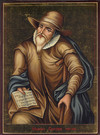Menno Simons on ... infant baptism
 In
regard to infant baptism we hold and confess, first, that it is a self-begotten
rite and human righteousness; for in all the New Testament there is not
a word said or commanded about baptizing infants, by Christ nor by the
apostles.
In
regard to infant baptism we hold and confess, first, that it is a self-begotten
rite and human righteousness; for in all the New Testament there is not
a word said or commanded about baptizing infants, by Christ nor by the
apostles.
Secondly, that it is a breaking and tearing to pieces of the ordinance of Christ; for he has commanded that the gospel should be preached and that those should be baptized who believe, Matt. 28:19; Mark 16:15. But here they baptize without divine command, without the preaching of the word, without knowledge, faith, repentance, new life, and without all consciousness and knowledge, yet it is called by the learned a holy, glorious work and a christian baptism and sacrament.
Thirdly, that it is a vain consolation and boasting of all the unrighteous; for, although they do not understand the word of God, do not know the truth and lead a licentious, carnal life, yet they boast themselves to be baptized christians.
Since infant baptism is such a pernicious superstition that it entirely destroys the Lord's baptism, and as the poor, blind world suffer themselves to be misled and consoled therewith, and as, besides, there is connected with it such fearful blasphemy, hypocrisy, adjuration; witchcraft and abuse of the glorious name of God that a godfearing heart may well be astounded thereat, therefore it is that we so strenuously oppose infant baptism, and openly confess that it is not of God or of his word but of anti-christ and of the bottomless pit.
Luther writes in a book on "Human doctrine" that that which is not commanded of God in religious matters of faith, is forbidden." Again, concerning the 12th chapter of Genesis he says, "That we should not accept any doctrines without certain reasons from the divine word."
Daniel writes, "Worship, without the word of God, is idolatry."
Philip Melancthon, in a book on the Jurisdiction and authority of the church, says, "That all worship which is not instituted of God by his express word, is false and wrong, let it be glozed over ever so much."
Here Luther and Melancthon have rightly expressed themselves according to the Scripture, although alas, they did not practice upon it. For if we read and well consider the Scriptures then we clearly find how pointedly God has commanded us that we shall not institute a religion of our own choice, but that we should do as he has commanded. On account of self-righteousness and self-chosen religion, Israel was severely visited and punished of the Lord.
Say not, beloved reader, as the ignorant do, that we thereby condemn our children because we do not suffer them to be baptized. O, no. For the Scripture does not connect the kingdom to words and water, but to the election and grace of the Father, in the merits of the death and blood of Christ.
Christ has promised the kingdom to small children, without baptism, Matt. 19:14; Mark 10:14; Luke 18:16. On account of this promise we are exceedingly rejoiced, and give thanks unto the Lord for the grace shown our children. Therefore, take heed, and mistake not; for to connect the election, grace, favor and kingdom of God to words, works, signs and the elements, is quite contrary to the merits, death, blood and word of the Lord; yea, open deceit, abomination and idolatry. [p. 269]
For they baptize before that which is represented by it (namely, faith) is found in us. This is no more sensible than to place the cart before the horse, to sow before we have plowed, to build before we have the lumber at hand, or to seal the letter before it is written. [p. 211]
Peruse all the Scriptures – Moses and the prophets, Christ Jesus
and the apostles, and diligently meditate upon them, and you will find
different instances that God was not only displeased at unbidden ceremonies
and worship, but that he has often severely punished such. O, dear Lord,
what blind reasoning! If they can, with a clear conscience do so because
it is not expressly forbidden that infants shall be baptized, then they
may as well accept holy water, candles, palms, clocks, confession before
a priest, masses, the building of convents, altars, the becoming of monks,
pilgrimages and the praying for the departed souls, &c., as just and
right; fot there is not a word to be found in the Scriptures which expressly
prohibits these works; or which says: You shall not do these things. [p.
50]
All excerpts are from The complete works of Menno Simon (Elkhart, Ind., 1871).